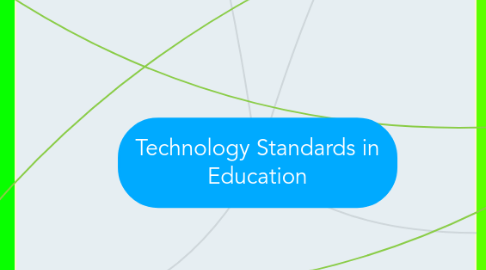Technology Standards in Education
by Veenesh Ramnarine

1. ICT Program of Studies
1.1. Communicating, Inquiring, Decision Making, and Problem Solving: Using a variety of ways to compute, process, and express information to a wide variety of people
1.2. Foundational operations, Knowledge and Concepts: Understanding different kinds of tech, ethical use (digital citizenship), media consumption, ergonomics and privacy
1.3. Process for Productivity The knowledge and skills that go into using technology ex) typing, data organization
1.4. ICT Curriculum
1.4.1. General Outcomes What the student should know at a certain level
1.4.2. Specific Outcomes The specific skills and knowledge needed for the General Outcome
1.4.3. Illustrative examples Sample Tasks
1.4.4. Assessment Frameworks How you determine competency
1.5. Software tools The actual type of programs used. Word, Excel, Powerpoint, etc.
2. ISTE Standards For Teachers
2.1. Facilitate and Inspire Student Learning and Creativity Creating an environment that engages students and encourages them to learn and explore
2.2. Design and Develop Digital Age Learning Experiences and Assessments Provide meaningful and real learning examples and use different methods to reach different students
2.3. Model Digital Age Work and Learning Understand current technology and transfer that understanding to students
2.4. Promote and Model Digital Citizenship and Responsibility Teach ethical use of tech and info. Also includes equitable access to technology
2.5. Engage In Professional Growth and Leadership Developing your own skills using the community, research, and the profession to improve student learning
3. ISTE Standards For Students
3.1. Empowered Learner Students use set personal goals and use their understanding of themselves to improve their learning process so they can understand, demonstrate, and transfer knowledge
3.2. Digital Citizen Developing a digital identity, learning about digital privacy and using technology ethically
3.3. Knowledge Constructor Using effective research to process information and express that information in a meaningful way to themselves and others
3.4. Innovative Designer Using different tech to produce creative solutions to open ended problems
3.5. Computational Thinker Using the computational power of tech to create an algorithmic way of thinking to solve problems
3.6. Creative Communicator Using technology in new ways to clearly communicate an idea to an intended audience
3.7. Global Collaborator Using tech to connect and work with peers around the world.
4. LPTF
4.1. Student Centred Learning Focus on how to learn, process info, and communicate. Includes digital citizenship.
4.2. Research and Innovation Teacher focus. Stay current with tech research
4.3. Professional Learning Teacher Focus. Applying the tech for teachers to grow professionally and then pass that on to students
4.4. Leadership Geared more towards higher school Authorities. Providing the right frameworks, policy and procedures for tech learning
4.5. Access, Infrastructure, and Digital Learning Environments Computer labs, plaotops for each student etc.


